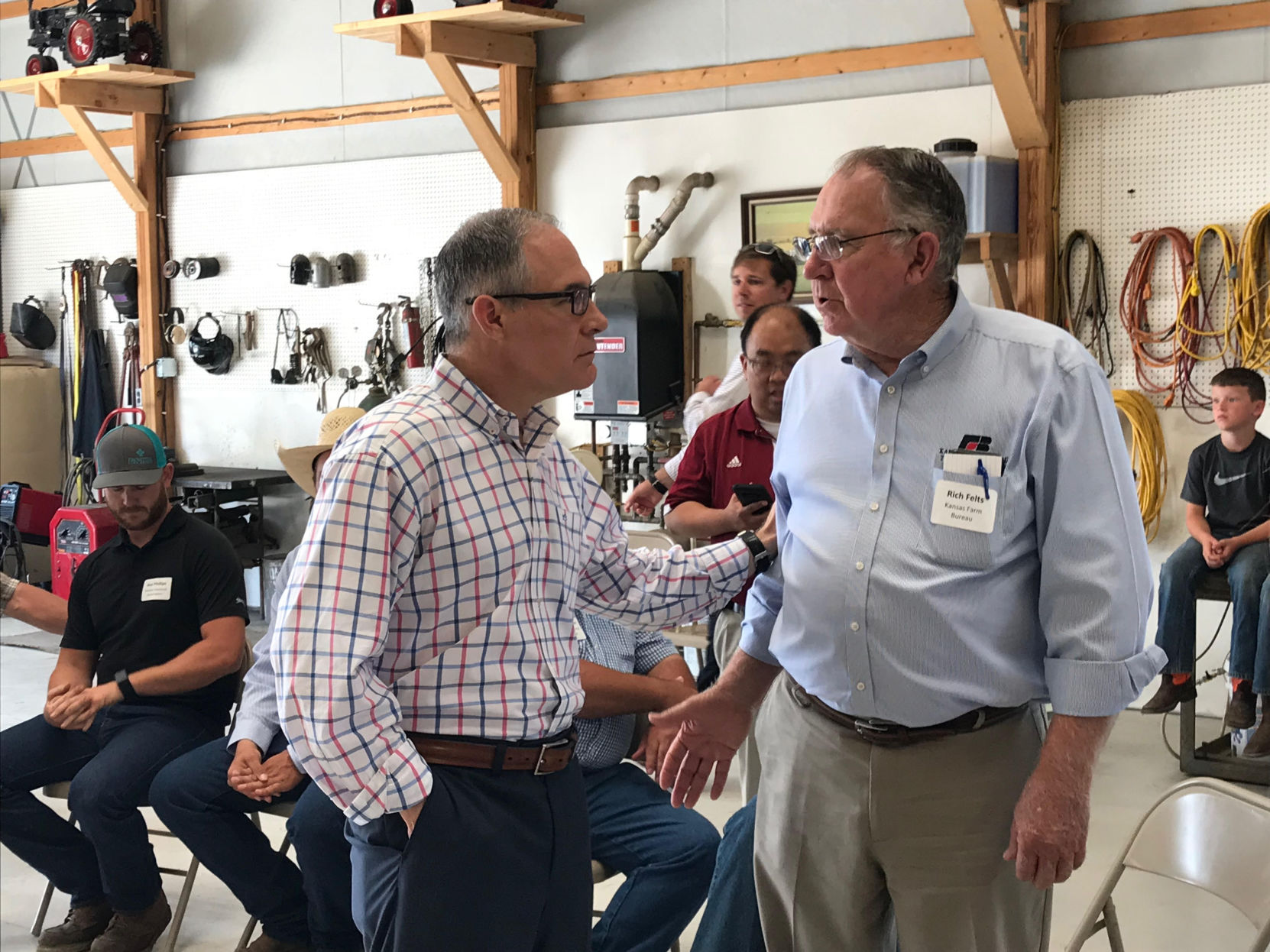Environmental Protection Agency administrator tells Flint Hills ranchers he’ll work to provide clarity regarding prescribed springtime burning

Just a few months after the smoke had cleared, Flint Hills ranchers gathered in a farm shed amid Kansas’ tallgrass prairie, telling Environmental Protection Agency Administrator Scott Pruitt why the annual rite of spring is so important.
Longtime Chase County Extension Agent Mike Holder was the first to pipe up. A good burn is the only way to control the prairie, he said.
“We are fortunate that good cattle management and good range management is also good prairie ecosystem management,” Holder, who serves as Kansas State University’s Flint Hills District Extension director, told Pruitt. “The key to that is grazing and burning. Burning is not an option. It is a necessity.”
The government regulator made a whirlwind trip through Kansas, June 12, first stopping at a Garnett ethanol plant where he was questioned by corn growers on how he has administered Renewable Fuel Standards, specifically his issuing of waivers to refineries, relieving them of complying with the ethanol mandate.
His visit to the Kevin Dedonder operation on the edge of the Flint Hills near Reading in Lyon County wasn’t quite as intense, but ranchers did share concerns about what would happen if their way of life was taken away.
Burning is a generations-old practice here. It spurs nutritious grass growth that helps cattle to efficiently gain more weight. It also clears the prairie of invasive plant species like brush and cedars.
However, the annual burns, which put smoke into the air for a few weeks during the year, draws criticism from environmental groups like the Sierra Club, along with urban areas, even as far away as Lincoln, Nebraska.
In the past, the Sierra Club has asked the EPA to put stricter limits on burning due to air quality.
Kansas Secretary of Agriculture Jackie McClaskey reminded Pruitt the state has a multi-agency Smoke Management Plan, developed in 2010 with input from the EPA to balance the need for prescribed fire in the Flint Hills with the need for clean air in downwind communities.
Meanwhile, leaders with the Kansas Livestock Association and Kansas Farm Bureau stressed urban centers like Lincoln or Kansas City shouldn’t be penalized for being out of compliance with Clean Air Act standards during burning season.
Holder said ranchers have had a good working relationship with EPA Region 7 officials.
“I feel strongly enough about burning, if you take burning out of the Flint Hills, you will lose the ecosystem,” he explained. “I don’t want to be part of that. I don’t think the EPA does.”
Pruitt emphasized implementing regulatory measures to provide long-term certainty and clarity for ranchers. He suggested formulating guidelines that would redefine special events like prescribed burning to make certain ranchers are in compliance.
“The greatest asset you have is your land and we need to recognize it,” Pruitt said, later adding, “There is a way forward.”
Pruitt told the agriculture media after the meeting that the administration understands ranchers’ worries. Going forward, the agency is going to make sure regulations are applied in a “consistent, thoughtful and common-sense way.”
“A prescribed burn should not be any different than a burn that is a tinderbox kind of situation that creates massive damage,” he said. “Burning prairies and having prescribed burns are very important to the ecosystem. They are very important to what happens to Kansas and Oklahoma and across the Midwest. It is good for the environment to recognize that. And we need to make sure on the air quality side that we accommodate that in our rulemaking process.”
Mike Collinge, a rancher from Hamilton, expressed gratitude to Pruitt for offering partnership and certainty. Ranchers, he said, need to be good neighbors and stewards, too.
“I think it behooves the agriculture community not to abuse that certainty and not abuse those privileges,” Collinge said, adding that ranchers have a “responsibility to try to be good neighbors with our urban dwellers. And we are not trying to make enemies at all. All of us have people who live in those places who are impacted. We aren’t trying to thumb our nose at them at all.”
Pruitt also offered clarity on other regulations that have been potential thorns for Kansas agriculture. He told ranchers the agency planned to introduce a new Waters of the U.S. rule by June 15.
Pruitt said the EPA handles many issues but called the WOTUS fix one of the greatest needs. His staff has been working on it since Feb. 28, 2017, when President Donald Trump issued an executive order to roll back the rule.
The announcement will give ranchers the security they need, he said.
“We aren’t going to tell you what Waters of the U.S. is,” he said. “We are going to tell you what it isn’t. Prairie potholes in North Dakota, groundwater, those aren’t Waters of the United States.”
Amy Bickel can be reached at 620-860-9433 or [email protected].

